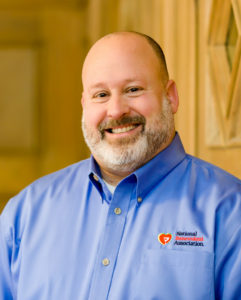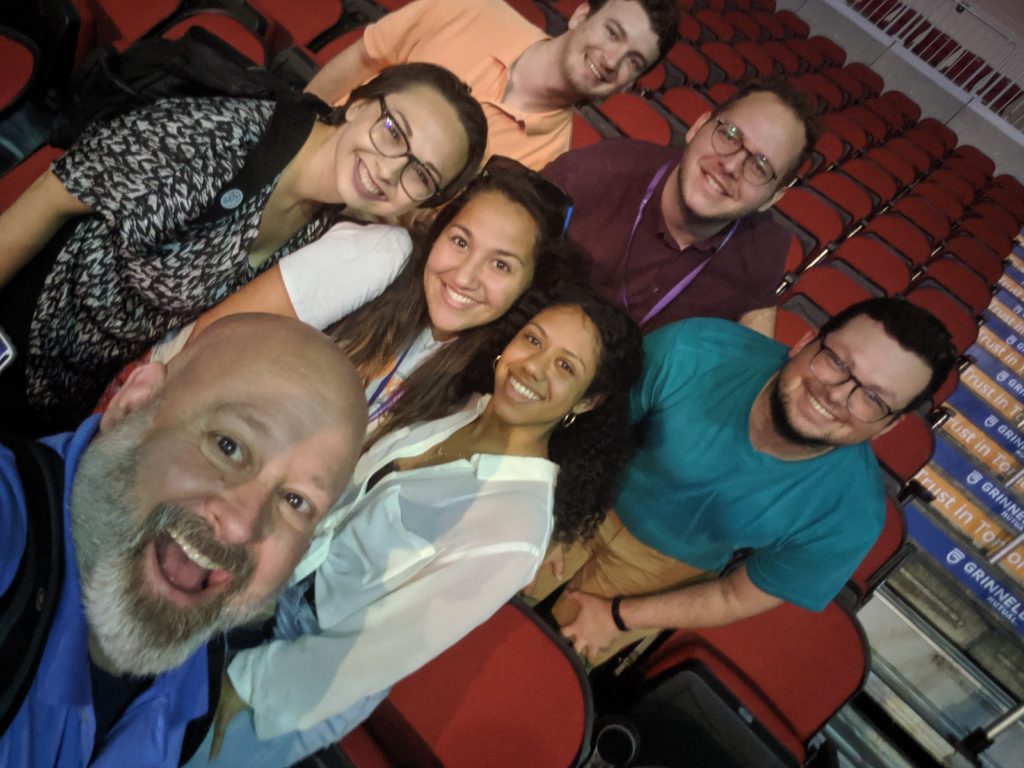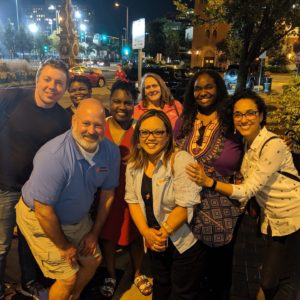Celebrating 10 Years of Service: A Q&A with President and CEO Mark Anderson
In January 2011, Mark D. Anderson came to NBA as the new President and CEO. Joining the staff during a time of transition, he knew that he’d need to come in ready to listen and learn from the leaders and partners in the organization, and that’s exactly what he did. Now, 10 years later, Mark has taken some time to reflect on what this ministry has meant to him, how he plans to celebrate this milestone, and his hopes for the next 10 years and beyond of the Christian Church’s (Disciples of Christ) health and social service ministry.
Join us in celebrating this milestone by making a gift to the NBA Mark D. Anderson Fund.
 #1 NBA: You started at NBA 10 years ago in January, what a milestone! What were some of your early thoughts or questions when you started in the role, as President and CEO, 10 years ago? What are your thoughts or insights now?
#1 NBA: You started at NBA 10 years ago in January, what a milestone! What were some of your early thoughts or questions when you started in the role, as President and CEO, 10 years ago? What are your thoughts or insights now?
MA: Being raised in the Disciples church and working for a brief time for NBA in the late 1990s, I understood the rich and full history of NBA’s ministry. The Board of Trustees was looking for a partner to vision the future of NBA. It was a pivotal moment that I knew would require deep engagement with the whole Church as we explored the relevancy of health and social service ministries in the life of the Christian Church (Disciples of Christ). I am grateful we took the intentional time and space to listen deeply to Disciples leaders, nonprofit executives, and General and Regional Ministries. If we did not undertake that endeavor, our mission would be lacking in authenticity.
#2 NBA: Why did you say yes to being NBA’s President and CEO? What has been in place that has allowed you to keep saying yes to this role 10 years on?
MA: I have always cherished the ministry of NBA, as well as having a deep love for my Church, the Christian Church (Disciples of Christ). As a social worker who has worked extensively in communities that have been marginalized by society, I saw this as an opportunity to wed my faith, caring for the vulnerable, with my social work skills. It has been a way for me to give back to a Church that has supported and sustained me throughout my life. I continue to say yes, because of the incredible ministry Disciples are engaged in across the denomination. There is never a lack of innovative and creative ideas from my colleagues, trustees, and Disciples who are living out the Gospel. We are Church.
#3 NBA: How has NBA as a ministry changed over the last 10 years, what’s been the most exciting change to witness with NBA ministries?
MA: Oh golly, there has been a lot of change! I think for me it was really being open to the Spirit and listening for where God was calling us to move in the health and social service arena. If we did not take this posture of openness and a willingness to take some risks, I fear we would still be treading water and wondering ‘is NBA relevant today?’
Through all the changes over the past 10 years, we have remained steadfast in our commitment to transparency and accountability – to one another, to all Disciples and to God. We also stand on the shoulders of giants who have gone before us to laid the pavement that we walk on today, so we honor our history, both the good and bad.
#4 NBA: When you think back on 10 years with NBA, are there key moments or milestones that you would name? In other words, what sticks out in your mind for you?
MA: In the early days of my tenure, I spent a lot of time listening. These were sacred moments as I knew, more times than not, I would be treading on some very tender terrain. Frequently these conversations were filled with anger about the bankruptcy that took place in the early 2000s. The pain was oftentimes palpable as people relived the dark days of NBA.
One meeting that I found so meaningful for my ministry and how NBA would move forward, was our gathering of Executives of the historic NBA service units, as well as other Disciples nonprofits not part of NBA. Needless to say, most of these relationships at best were strained, and in worst case scenario, there was no relationship. That meeting allowed us to hear one another and determine ways to begin building back a healthy relationship, one that would honor our shared past and allow us all to look forward to the future. I believe many of our programs today have been built on the foundation of these sacred conversations.
#5 NBA: This organization has been able to do some incredible things in the last decade — new programs were launched such as NBA XPLOR, a model of young adult leadership development, the Social Entrepreneurs program, Peer Learning & Wellness Groups, Mental Health and Wellness initiative, and, most recently, the Community Engagement program. NBA also responded to instances of injustice in Ferguson, Missouri, started collaborative partnerships with Week of Compassion, New Church Ministries, and many other ministries of the Disciples Church. Reflect on the significance of “forward leaning” into new ways and models of health and social service ministries?

MA: From the beginning of my tenure, when we identified our core values that would guide us, a key one was ‘forward leaning.’ I appreciate this value as it makes clear that NBA will be paying attention to the horizon, not only the changes related to health and social service ministries, but also the Church. As a general ministry of the Christian Church (Disciples of Christ), it’s important for us not to remain stagnant and always remain the same. We as people, and our church, are changing, so how do we lean into this dynamic and adjust, pivot, or make a whole new path for doing ministry.
#6 NBA: What would you name are some of the best learnings you have experienced in the past 10 years?
MA: There have been so many learnings, but I think a key learning for me has been to stay in the conversation. Find ways to remain in relationship with one another, even when the road gets tough. My faith calls upon me to do just this. A year and a half ago, the NBA embarked on an important conversation related to anti-racism and anti-oppression. We first engaged our staff and have recently begun this work with our Board of Trustees. This work of identifying ways to dismantle systemic racism within your own ministry is never easy, but by engaging in this challenging work, it is key to who NBA can become. By building up trust among our staff and partners, we begin to chip away at the White Supremacy Culture we have been swimming in for years. This is not as simple as a two-day training, but spending time reflecting, challenging, and making a new way forward. It is often said that the work of dismantling oppressive systems is not a sprint, but a marathon. I look forward to sharing more of our learnings as we journey on this marathon.
#7 NBA: How does NBA reflect who we are as Disciples?
MA: Have I said it already that I love being a Disciple? Like many of you, the table is central to our faith and how we identify as Disciples. I have always been drawn to the open table, the open invitation to all of God’s people, to join in the grace-filled meal. There is plenty for all, come, right? When I began with NBA in 2011, we were living in a restrictive model of who are partners could be, but we expanded our understanding of how NBA could leverage our abundance to serve and support a variety of health and social service ministries – not only established nonprofits, but start-ups and congregational ministries. NBA is church, and in true Disciples fashion we opened the table up wide and invited all to come. After all, it is not our table, but God’s table.
#8 NBA: In celebration of your 10 years with NBA, the NBA Mark D. Anderson Fund is being established in partnership with the Christian Church Foundation. Why was it important to establish this fund, what will donations to it support?

MA: I believe strongly in supporting ministries you have an infinity with their mission, and this includes making an ongoing financial commitment. I make a recurring gift to NBA on an annual basis, but I wanted to create a fund that would sustain the ministry past my tenure. Generosity of time, talents and resources has always been a part of our family. My mom and dad were always engaged in caring for people through hands on work, but they also understood the importance of putting their money where their mouth was. This named fund is in honor of their generosity and a commitment to the church they loved so dearly. The fund will support the innovative, creative, and ever-changing ways NBA carries out its mission of supporting Disciples-related health and social service ministries.
#9 NBA: What keeps you laughing and hopeful?
MA: There are many things that keep me laughing. I’m not sure you can be in conversation with me without me breaking into laughter at some point. I oftentimes, chuckle at myself, and the insane things I do. You have seen my social media posts, correct? I have been blessed to come from a family that nurtured joy and laughter. Joy and hope go hand in hand. Every day I get to witness the incredible joy that comes from caring for God’s people by amazing Disciples. These amazing slices of joy, bring me much hope for our world, and for sure laughter will always come forth in this celebration.
#10 NBA: What are your hopes for the NBA for the next 10 years of ministry?
MA: There are so many hopes to name….do we have 8 hours? As we journey with Disciples in creating communities of compassion and care, I hope we remain open to new ideas, new ways of doing things. I hope we don’t remain stagnant but stay committed to stretching ourselves and our resources just a little bit more. I also hope more Disciples will join us on this journey, whether it is your health and social service ministry that needs support, or those who want to make a commitment financially to support this ministry. I always say, “this is not my work, NBA’s work, but this is the work of the whole Church.” The table is wide, and I hope more people join us at the table.
Join us in celebrating this milestone by making a gift to the NBA Mark D. Anderson Fund. Thank you!